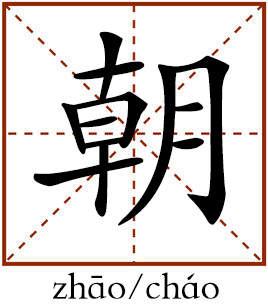Dynasty

When this character is pronounced as zhāo, it means morning. When pronounced as cháo, it often refers to a dynasty. In ancient China, emperors held court early in the morning, announcing policy and giving orders to officials. The court was called chao ting. Perhaps this is why a period during which a particular family ruled China or part of the country was called a chao.
南朝四百八十寺
nán cháo sì bǎi bā shí sì
Nan chao is the Southern Dynasty (420–589) in imperial China. Si bai ba shi is the number “480” and si refers to temples.
This is a line from a poem titled “Jiangnan Chun” (“Spring on the Southern Rivershore”) by the Tang poet Du Mu (803–852). The poem was composed during a journey of the author towards the south. “Orioles sing for miles amid red blooms and green trees;/ By hills and rills wine shop streamers wave in the breeze./ Four hundred eighty splendid temples still remain;/ Of Southern Dynasties in the mist and rain” (trans. Xu Yuanchong).
In the first half of the poem, Du depicts a beautiful scene of Jiangnan in spring, in which green trees and red blossoms are found everywhere with orioles chirping away. Flying streamers of wine shops at the lakeside and hillsides portray bustling towns and villages in southern China, where people live vigorous lives.
There are different interpretations about the last half of the poem. A common guess associates it with the failure of the Southern Dynasty, which was accompanied by the increasing popularity of Buddhism. Emperors in the late Southern Dynasty were obsessed with Buddhism and built hundreds of temples around the capital. The Southern Dynasty finally ended in chaos and corruption at court. Du lived in the late Tang Dynasty, a period in which the government grew weaker and the country declined. Similar to the rulers of the Southern Dynasty, Emperor Xianzong of Tang and his successors were obsessed with Buddhism and spent a lot of money on building temples. Therefore, it is said that Du expresses his worries about the Tang government in the poem by sarcastically citing the failure of the Southern Dynasty in his reference to the empty temples.
edited by REN GUANHONG
